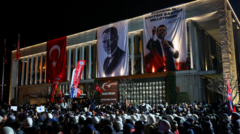Thousands of demonstrators have flooded the streets of Turkey for the seventh consecutive night amid escalating tensions following the arrest of Istanbul's Mayor Ekrem Imamoglu. The protests erupted last Wednesday when Imamoglu, a prominent figure viewed as President Recep Tayyip Erdogan's primary political adversary, was taken into custody on corruption charges. In response, over 1,400 individuals, including students, journalists, and legal professionals, have been detained, according to the Turkish interior ministry.
The United Nations and various human rights organizations have condemned these arrests, along with police violence against protesters. In a recent address, President Erdogan called for patience, labeling the situation as "very sensitive." He warned against those attempting to plunge Turkey into chaos, describing their path as "a dead end."
Demonstrators, particularly students from multiple universities, gathered Tuesday in Istanbul's Maçka Park before marching towards Şişli. Many wore masks or scarves, expressing concerns over police identification. The government has imposed a ban on protests in Istanbul while closing several roads in an effort to maintain order.
Turkey’s Republican People's Party (CHP) has announced plans to hold a rally on Saturday to oppose Imamoglu’s arrest and to advocate for transparent trials and early elections. Amid these protests, the interior minister revealed the government has arrested 1,418 individuals, characterizing the demonstrations as "illegal."
As tensions rise, several journalists, including AFP photographer Yasin Akgül, have also faced legal repercussions for their coverage of the unrest. A letter from AFP's chairman to Erdogan called for Akgül's release, emphasizing that he was merely reporting on the events.
Imamoglu's arrest has drawn widespread attention due to his status as a strong rival to Erdogan, who has dominated Turkish politics for over two decades. Critics have questioned the motives behind his detention, suggesting it could be politically motivated. Current laws prevent Erdogan from seeking another term in 2028; however, he retains the option to call for early elections or modify the constitution to extend his presidency. The Ministry of Justice in Turkey has defended its judicial processes while refuting claims of Erdogan's involvement in the arrests.
The United Nations and various human rights organizations have condemned these arrests, along with police violence against protesters. In a recent address, President Erdogan called for patience, labeling the situation as "very sensitive." He warned against those attempting to plunge Turkey into chaos, describing their path as "a dead end."
Demonstrators, particularly students from multiple universities, gathered Tuesday in Istanbul's Maçka Park before marching towards Şişli. Many wore masks or scarves, expressing concerns over police identification. The government has imposed a ban on protests in Istanbul while closing several roads in an effort to maintain order.
Turkey’s Republican People's Party (CHP) has announced plans to hold a rally on Saturday to oppose Imamoglu’s arrest and to advocate for transparent trials and early elections. Amid these protests, the interior minister revealed the government has arrested 1,418 individuals, characterizing the demonstrations as "illegal."
As tensions rise, several journalists, including AFP photographer Yasin Akgül, have also faced legal repercussions for their coverage of the unrest. A letter from AFP's chairman to Erdogan called for Akgül's release, emphasizing that he was merely reporting on the events.
Imamoglu's arrest has drawn widespread attention due to his status as a strong rival to Erdogan, who has dominated Turkish politics for over two decades. Critics have questioned the motives behind his detention, suggesting it could be politically motivated. Current laws prevent Erdogan from seeking another term in 2028; however, he retains the option to call for early elections or modify the constitution to extend his presidency. The Ministry of Justice in Turkey has defended its judicial processes while refuting claims of Erdogan's involvement in the arrests.



















